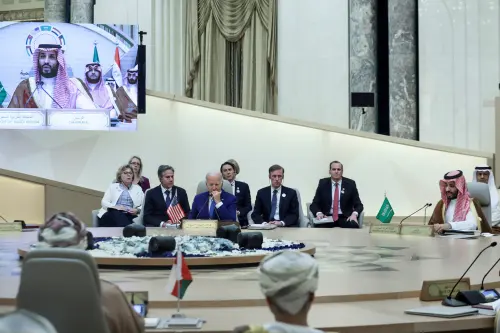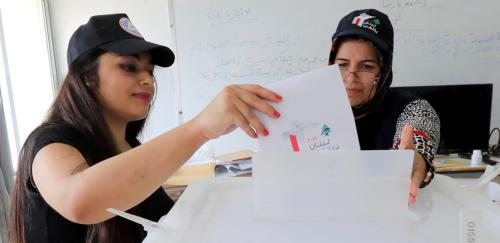With much of the Middle East either in violent conflict or undemocratic, one Arab country is holding genuine elections this week: Lebanon.
Barring some last-minute black swan event like the outbreak of war—always possible in that part of the world—elections should indeed be held this Sunday, May 6.
And if the vote happens, there’s plenty of good in that. Foremost of which is that Lebanon will again have a more legitimate parliament—elections were due in 2013, but have been postponed a number of times.
Further, a number of important reforms via an electoral law passed last year should make the voting more vibrant. First, the voting will take place on a single day, instead of spread across multiple days, and using a new biometric voting card, leaving less room for electoral mischief.
Second, Lebanon has eliminated the old BYOB (bring your own ballot) system. Yep, that’s right: Until now, Lebanese voters largely brought their own ballots with them to polls that political organizers or family elders had often handed them—which essentially meant they were pressured to vote one way or another. Ballots will now be preprinted, giving individuals more genuine freedom of choice in the voting booth.
Third, allowing—finally—Lebanese expatriates to vote absentee from overseas erases a long-contentious issue. Some Lebanese feared that the millions of Lebanese overseas, who don’t have to contend with the day-to-day travails of life in the country, could dramatically alter election results by voting for traditionalist parties. But many others strongly felt it was their right to vote even if they were permanently residing overseas. In the end, only about 80,000 Lebanese registered to vote overseas—thus, their impact would be small among the millions of local voters, allowing the country to move on to other matters.
Fourth, there is a new hybrid voting system that combines a form of district-based proportional representation—where voters select first for a slate of candidates—with a preferential voting system where voters select their top pick from that slate. Voters should thus have a clearer choice between the policies of slates of candidates, and the individual candidates themselves within those slates.
That’s the good news. Taken together, these reforms will likely mean less corruption and more genuine expression of voter preferences for both slates of candidates that in many cases represent reform agendas, and preferences for individual candidates within those slates.
Indeed, there seems to be a new electoral air in Lebanon: In the 2016 municipal elections held across about a thousand localities, roughly one-third of voters defected from major political parties. And a poll conducted for the National Democratic Institute found that 47 percent of Lebanese say they will not vote for any of the established political parties. On the other hand, though, many feel that the campaigning by new civil society candidates has been lackluster. But again, it is impossible to predict the results in advance.
But there’s bad news too. At its heart, Lebanon’s electoral system remains a consociational system, where the 128 seats in parliament are apportioned based on a formula negotiated in 1989 for a fixed number of 64 Christian seats and 64 Muslim seats, both of which are further subdivided along sectarian lines—34 for Maronite Christians, 27 each for Sunni and Shia Muslims, 14 for Orthodox Christians, the rest for other Christian and Muslim minorities. Imagine telling American voters that of our 435 members of Congress, it was preordained that 109 would be evangelical, 91 Catholic, 9 Jewish, 4 Muslim, and so on. Doesn’t sit well, does it? To make matters worse, the apportionment doesn’t match Lebanon’s actual religious distribution—Christians as a whole get half the seats but may represent only 37 percent of voters, Muslims representing 63 percent get the other half. This imbalance fuels a sense by the underrepresented that the system fails them, which contributes to social tension.
Additionally, most of the same families, power brokers, and parties who have dominated Lebanese politics for decades are also expected to run—and win—because they themselves gerrymandered districts and rules in a highly complex manner to their benefit. But the current elections law may give some space for new candidates to win as well. So, watch to see if new candidates and parties outside the traditional intra-group patronage networks can gain seats in parliament. That will be the indication that the new parliament can address the issues on the minds of voters such as persistent corruption, uncollected garbage, and intermittent electricity supply, just to name a few.
 At the end of the day, the current electoral system may suit the country—warts and all. It guarantees religious minorities that they will indeed have parliamentary power, thereby mitigating, to an extent, deeply held fears that sometimes drive violent conflict. And indeed, the formula has helped hold Lebanon together since the conclusion of its civil war which ended in 1990. And compared to an Arab world filled with either war, sham elections, or undemocratic regimes, things could clearly be much worse.
At the end of the day, the current electoral system may suit the country—warts and all. It guarantees religious minorities that they will indeed have parliamentary power, thereby mitigating, to an extent, deeply held fears that sometimes drive violent conflict. And indeed, the formula has helped hold Lebanon together since the conclusion of its civil war which ended in 1990. And compared to an Arab world filled with either war, sham elections, or undemocratic regimes, things could clearly be much worse.
During the last parliamentary elections—in 2009—when the votes were counted and coalitions were built, 71 of the 128 seats went to a pro-Western alliance, and 57 went to the alliance supported by Hezbollah. This included 19 independents who eventually caucused with one of the two alliances to stay relevant.
This time, after its election day, Lebanon should wake up to a new, and at long last, legitimate parliament. On the one hand, although we know in advance the sectarian balance, and many of the results will be predictable, the new electoral system may create space for few—good—surprises, which perhaps may initiate some positive reforms in the years ahead. Stay tuned. At least—for both Lebanon and the world—one can hope.
The Brookings Institution is committed to quality, independence, and impact.
We are supported by a diverse array of funders. In line with our values and policies, each Brookings publication represents the sole views of its author(s).





Commentary
Lebanese elections: Good for the country, warts and all
May 1, 2018